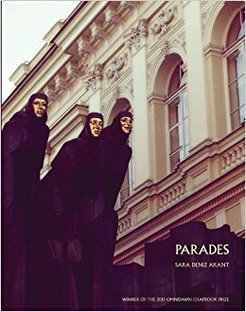Parades, Sara Deniz Akant
reviewed by John Bonanni

I received Sara Deniz Akant’s Parades (2014) at the perfect time—just days before Halloween. I’m not sure if this was the solid marketing of Omnidawn Publishing, or mere coincidence, but this chapbook will haunt you, not only with images of ghosts speckled from the first page throughout the book but also with remnants of dead white men whose metered verse feels fragmented, torn, and echoing.
Not that this is actually their metered verse, as one might get with an actual erasure collection, but one can pick up on traces of Poe here—the “scratching wall” in the poem “Mark,” and the line “no it’s not so very raven, such thin walled bones” (“Finga”), or even Twain when describing “Sawyer gadgets” in “Machines on the Move.”
Winner of the Omnidawn Poetry Chapbook Competition, one of the many feelings left upon the reader will be that of frustration. What’s experimental about it? The bizarre forms, the abandoned syntax, some foreign languages here and there, a more challenging demand for comprehension, and an extra use of keyboard symbols. What wasn’t? The rhythm, the rhyme, the strange lurking of late Romanticism and the occasional return to formalism and syntax. As is the case with most experimental poetry, we won’t “get” all of it. Oftentimes, I felt like I was reading an erasure poem—except that it often bounced with metered rhythm and rhyme. Poems like “The Baboon,” while skating across the page looking fragmented with all its chunks of white space, at the same time, sounded quite villanelly.
Admittedly, some of the typographical choices that have become set within the poetry felt to me a little gimmicky—meant more for ornamental decoration than to enhance some of the poems. This was the case with poems like “Uptron,” “Itgara 2.0,” and “April Ltd.” In one case, the poem “^ Wilbaso ^” felt successful with all of its bizarre carrots, inching the eyes upward in verse “half-trolling^the eies,” and certainly much of the forms used by Deniz Akant felt new, straying from your typical Academy tercet/couplet into centered, justified wide margined prose pieces, followed by less marginalized prose poems broken with repetitive hyphens (which just look like really long lines). Essentially, Sara Deniz Akant is reworking what we know of the prose poem in many of these pieces, but much more fragmented, and a lot more caesuraed. Comprehensively, the collection moves from what feels like an establishment of setting, piecing itself together through a collection of character-driven poems marking the dead from abandoned spaces, and turning on itself in dystopian machinery. At least for me.
Not that this is actually their metered verse, as one might get with an actual erasure collection, but one can pick up on traces of Poe here—the “scratching wall” in the poem “Mark,” and the line “no it’s not so very raven, such thin walled bones” (“Finga”), or even Twain when describing “Sawyer gadgets” in “Machines on the Move.”
Winner of the Omnidawn Poetry Chapbook Competition, one of the many feelings left upon the reader will be that of frustration. What’s experimental about it? The bizarre forms, the abandoned syntax, some foreign languages here and there, a more challenging demand for comprehension, and an extra use of keyboard symbols. What wasn’t? The rhythm, the rhyme, the strange lurking of late Romanticism and the occasional return to formalism and syntax. As is the case with most experimental poetry, we won’t “get” all of it. Oftentimes, I felt like I was reading an erasure poem—except that it often bounced with metered rhythm and rhyme. Poems like “The Baboon,” while skating across the page looking fragmented with all its chunks of white space, at the same time, sounded quite villanelly.
Admittedly, some of the typographical choices that have become set within the poetry felt to me a little gimmicky—meant more for ornamental decoration than to enhance some of the poems. This was the case with poems like “Uptron,” “Itgara 2.0,” and “April Ltd.” In one case, the poem “^ Wilbaso ^” felt successful with all of its bizarre carrots, inching the eyes upward in verse “half-trolling^the eies,” and certainly much of the forms used by Deniz Akant felt new, straying from your typical Academy tercet/couplet into centered, justified wide margined prose pieces, followed by less marginalized prose poems broken with repetitive hyphens (which just look like really long lines). Essentially, Sara Deniz Akant is reworking what we know of the prose poem in many of these pieces, but much more fragmented, and a lot more caesuraed. Comprehensively, the collection moves from what feels like an establishment of setting, piecing itself together through a collection of character-driven poems marking the dead from abandoned spaces, and turning on itself in dystopian machinery. At least for me.
John Bonanni lives on Cape Cod. He is the recipient of grants from the Arts Foundation of Cape Cod and the Massachusetts Cultural Council in Brewster, as well as a scholarship from the Fine Arts Work Center in Provincetown and a residency from AS220 in Providence, RI. His work has appeared or is forthcoming in Hayden's Ferry Review, CutBank, the Seattle Review, Assaracus, Verse Daily, and Prairie Schooner, among others.